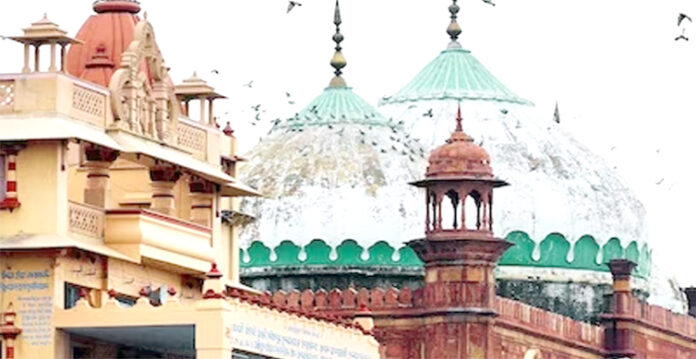The Allahabad High Court on Wednesday dismissed an application seeking to recall its January 11 order that consolidated all suits filed by the Hindu side in the long-standing Krishna Janmabhoomi-Shahi Idgah dispute in Mathura. The court maintained its earlier decision, which brought together 15 separate suits concerning the contentious religious site.
The dispute revolves around the Shahi Idgah mosque, which is located adjacent to the Krishna Janmabhoomi, the believed birthplace of Lord Krishna. The Hindu plaintiffs argue that the mosque, built during the reign of Mughal emperor Aurangzeb, stands on the site of a temple that was demolished centuries ago.
The recall application was filed by Tasneem Ahmadi, representing the Muslim side. The counsel argued that consolidating the cases at this stage was premature, as the framing of issues and collection of evidence had not yet begun. Ahmadi contended that the court should not merge the cases before these critical procedural steps were completed.
In response, the Hindu side, represented by counsel Hari Shanker Jain, argued that once the court determined that the relief sought, the property in question, and the defendants were the same in all the suits, it was within the court’s authority to consolidate the cases. Jain emphasized that the consolidation did not interfere with any party’s right to contest each case, but rather streamlined the judicial process.
The court agreed with this reasoning, rejecting the Muslim side’s plea and reiterating that the consolidation of cases is a discretionary power of the judiciary, which cannot be arbitrarily challenged by either party. The court also expressed concern that the recall application might have been filed with the intention of delaying proceedings.
The High Court first ordered the consolidation of the suits on January 11, 2024, “in the interest of justice,” after the Hindu plaintiffs sought the unification of the cases. The court found that all 15 suits related to the same disputed site, and the claims made by the Hindu plaintiffs were similar in nature, all revolving around the removal of the Shahi Idgah and possession of the land where the mosque stands.
On August 1, 2024, the High Court had already rejected a plea from the Muslim side, which questioned the maintainability of the suits filed by the Hindu worshippers. In that ruling, the court held that all the suits were legally maintainable and were not barred by the Limitation Act, the Waqf Act, or the Places of Worship Act of 1991. The Places of Worship Act specifically prohibits the conversion of any religious structure as it existed on August 15, 1947.
Despite the August ruling, no formal issues have been framed by the court, as the hearings thus far have been dedicated to addressing preliminary applications. The court has now scheduled November 6, 2024, as the next date for hearings. On that day, the court is expected to move forward with framing the issues and advancing the cases.
The Krishna Janmabhoomi-Shahi Idgah dispute has long been a sensitive and highly contested issue. The Hindu plaintiffs claim that the Shahi Idgah mosque was constructed after a temple at the site was demolished, which, according to them, was the birthplace of Lord Krishna. The Muslim side, however, asserts that the mosque is legally protected, pointing to the Places of Worship Act, which seeks to maintain the religious status of structures as they stood in 1947.
The Allahabad High Court’s decision to consolidate the cases and allow the suits to proceed has intensified the legal battle over the historic site. With the upcoming hearing in November, the case continues to hold national significance, drawing attention from religious, political, and legal communities alike.
As the dispute moves through the courts, both sides remain entrenched in their positions, with the final outcome likely to have lasting implications for the handling of religious disputes in India.
(This story is sourced from a third-party syndicated feed. Raavi Media takes no responsibility or liability of any nature. Raavi Media management/ythisnews.com can alter or delete the content without notice for any reason.)


